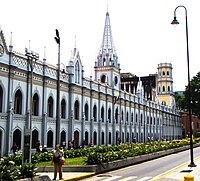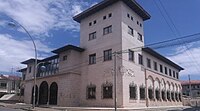Association of Spanish Language Academies
The Association of Academies of the Spanish Language (ASALE) is the entity and international institutional organization in charge of bringing together the different Academies of the Spanish Language in order to promote unity, integrity and development of the Spanish language.
It was formed in Mexico in 1951, originally made up of the twenty Academies already existing in sovereign countries where Spanish is both the official and vehicular language (plus the Philippines, which already had its own Academy). There are currently twenty-four Spanish Language Academies that make it up, with incorporations from institutions founded later in countries with a strong presence of the Spanish-speaking community (for example, the United States) and historical links with Spain.
Its permanent commission is located in Madrid (Spain), a city where the headquarters of the Royal Spanish Academy (RAE) and the headquarters of the Instituto Cervantes are also located. ASALE's motto is "One lineage, one language and one destiny".
History
In April 1951, at the initiative of the then President of Mexico, Miguel Alemán Valdés, the I Congress of Academies was convened in what would be the first of the sixteen ordinary congresses of ASALE to date. Precisely the Royal Spanish Academy, for political reasons, was not present at that first call. Held between April 23 and May 6, 1951, the ASALE Association and Permanent Commission was created within the framework of the congress, in which Spain did participate that year. Since the II Congress, held in 1956 in Madrid, ASALE's permanent headquarters, the RAE has regularly participated in its congresses and sessions.
This collaboration between the RAE and the language academies is expressed in the co-authorship, from the XXII edition (2001), of the Dictionary of the Spanish language, the Ortografía< /i> in its 1999 and 2010 editions, considered a pan-Hispanic work, and the Pan-Hispanic Dictionary of Dudes (2005).
Joint works are the writing by the Grammar Association and the preparation of a Dictionary of Americanisms. Since 2000, she has organized the School of Hispanic Lexicography, which has scholarships granted by an agreement between the RAE and the Carolina Foundation for the training of experts in Spanish lexicography.
The Association, together with the Royal Spanish Academy, was awarded the 2000 Prince of Asturias Award for Concord for their collaboration and consensus efforts.
Organization of the Association
The Association holds a Congress every four years, although various circumstances have prevented it from fulfilling this aspiration at times. The Association is directed by the Permanent Commission, made up of a president (position held by the Director of the RAE), a general secretary (who falls to an academic from any of the associated academies, except the RAE, elected by Congress), the treasurer appointed by the RAE and four members of the associated academies who take turns annually. Since 1970, at the III Congress of Academies held in Bogotá, Colombia, a multilateral agreement has been approved by which the governments of the countries that have a language academy commit to supporting it and providing it with the physical and financial means for the carrying out their activities. These measures also apply to the Association of Spanish Language Academies.
Member Academies
The following Spanish Language Academies are part of the Association (ordered by year of creation):
Latest additions
From the statutes of 1859, it is regulated that the Royal Spanish Academy can designate foreign personalities from countries linked in one way or another with the Spanish language as corresponding academics. These academics, upon reaching a certain critical mass, will coordinate to give rise to the appearance of new Academies from 1871, first in countries where it was an official language and later, from the second half of the century xx, in countries with a strong presence of the Spanish language, in all its varieties, such as the founding in 1973 of the North American Academy of the Spanish Language and its incorporation into ASALE in 1980.
In 2009, the Royal Spanish Academy included five members from Equatorial Guinea on its faculty, an African republic that was part of the group of countries that, despite its close historical ties to Spain and having a significant portion of its population integrated into a Spanish-speaking cultural environment, did not have a proper academic institution of the Spanish language. Consequently, at the end of 2013, the President of Equatorial Guinea, Teodoro Obiang, inaugurated the Equatorial Guinean Academy of the Spanish Language, officially announced by the then director of the Royal Spanish Academy, José Manuel Blecua Perdices. Since March 19, 2016 it belongs to the Association of Spanish Language Academies. The procedures for admission to this academy had begun a year earlier.
In process of incorporation
Judeo-Spanish Academy
The last academy recognized by ASALE has been the National Judeo-Spanish Academy (proper: Academia Nasionala del Ladino), based in Jerusalem, although to this day it is not yet integrated into the ASALE (however, its president is part of the panel of presidents of the ASALE academies).
The foundation of a Jewish-Spanish academy has been considered a pending task for years, considered a priority and promoted by personalities such as the president of ASALE, Santiago Muñoz Machado, and by the Jewish-Spanish community itself, which has expressed its interest in the formalization of such relationships. The Sephardic institute was founded in February 2018. In January 2020, the first plenary assembly of the twenty-two academics of the institution took place, in October of the same year it was formally recognized by ASALE, and in December, in In the middle of the second wave of the COVID-19 pandemic, it officially presented itself as the National Judeo-Spanish Academy, agreeing on the official name of the institute in both languages, namely Ladino and Spanish. In January 2021, linguist and professor Ora Schwarzwald was confirmed as the Academy's first president.
Seen by a certain part of the linguistic community as a language of its own with its own —and heterogeneous— features, Judeo-Spanish is nonetheless considered by ASALE as a variety of the Spanish language, which retains many features of pre-century Castilian XVI. Its incorporation into the family of language academies is certainly interesting from a regulatory point of view, being the the first Academy that would be exempt from the ASALE recommendations regarding the development of the modern Spanish language. Nor is it clear what would be the position of variants such as haquetía within this institution, which have moved away from Ladino, and therefore from Spanish (with strong influences from local languages, especially Moroccan Arabic), but which nevertheless continue to be Judeo-Spanish languages.
Ordinary congresses
Other entities of the Spanish language in the world
Beyond the Academies of the Spanish Language, which are the regulatory entities belonging to ASALE in each country, and the Instituto Cervantes, a Spanish entity with offices in different countries, there are other entities with official status in their respective countries that are part of the network of institutions whose mission is to preserve and disseminate the Spanish language. These institutions, recognized by ASALE as disseminating entities of the Spanish language, are:
Contenido relacionado
Φ
Ϙ
Ν















